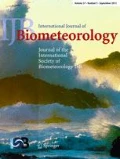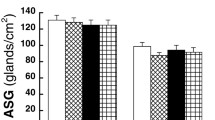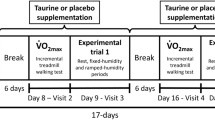Abstract
The purpose of this investigation was to examine the effects of aging and aerobic fitness on exercise- and methylcholine-induced sweating responses during heat acclimation. Five younger [Y group – age: 23±1 (SEM) years; maximal oxygen consumption (V.O2max): 47±3 ml·kg–1·min–1], four highly fit older (HO group – 63±3 years; 48±4 ml·kg–1·min–1) and five normally fit older men (NO group – 67±3 years; 30±1 ml·kg–1·min–1) who were matched for height, body mass and percentage fat, were heat acclimated by daily cycle exercise (≈35% V.O2max for 90 min) in a hot (43°C, 30% RH) environment for 8 days. The heat acclimation regimen increased performance time, lowered final rectal temperature (T re) and percentage maximal heart rate (%HRmax), improved thermal comfort and decreased sweat sodium concentration similarly in all groups. Although total body sweating rates (M.sw) during acclimation were significantly greater in the Y and HO groups than in the NO group (P<0.01) (because of the lower absolute workload in the NO group), the M.sw did not change in all groups with the acclimation sessions. Neither were local sweating rates (m. sw) on chest, back, forearm and thigh changed in all groups by the acclimation. The HO group presented greater forearm m. sw (30–90 min) values and the Y group had greater back and thigh m. sw (early in exercise) values, compared to the other groups (P<0.001). In a methylcholine injection test on days immediately before and after the acclimation, the order of sweat output per gland (SGO) on chest, back and thigh was Y>HO>NO, and on the forearm Y=HO>NO. No group differences were observed for activated sweat gland density at any site. The SGO at the respective sites increased in the post-acclimation test regardless of group (P<0.01), but on the thigh the magnitude of the increase was lower in the NO (P<0.02) and HO (P=0.07) groups than in the Y group. These findings suggest that heat tolerance and the improvement with acclimation are little impaired not only in highly fit older but also normally fit older men, when the subjects exercised at the same relative exercise intensity. Furthermore, the changes induced by acclimation appear associated with an age-related decrease in V.O2max. However methylcholine-activated SGO and the magnitude of improvement of SGO with acclimation are related not only to V.O2max but also to aging, suggesting that sensitivity to cholinergic stimulation decreases with aging.
Similar content being viewed by others
Author information
Authors and Affiliations
Additional information
Received: 8 May 1998/Accepted: 5 October 1998
Rights and permissions
About this article
Cite this article
Inoue, Y., Havenith, G., Kenney, W. et al. Exercise- and methylcholine-induced sweating responses in older and younger men: effect of heat acclimation and aerobic fitness. Int J Biometeorol 42, 210–216 (1999). https://doi.org/10.1007/s004840050107
Issue Date:
DOI: https://doi.org/10.1007/s004840050107




